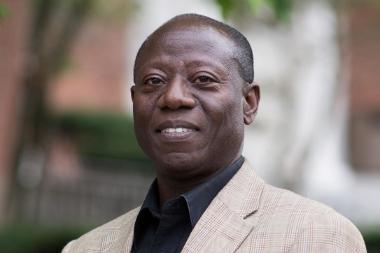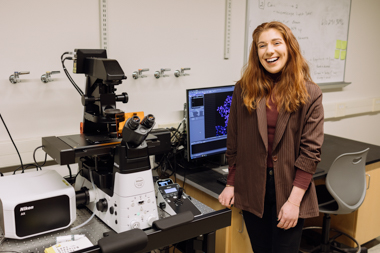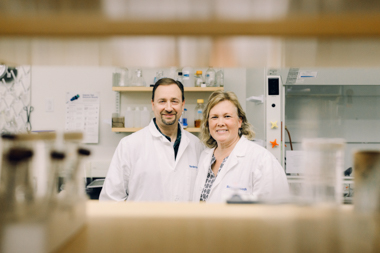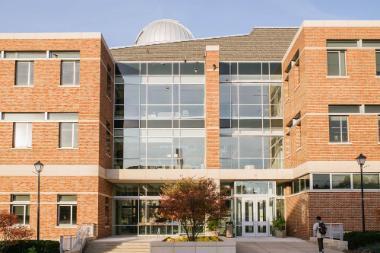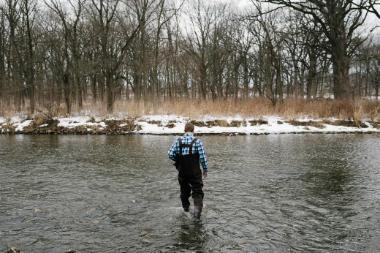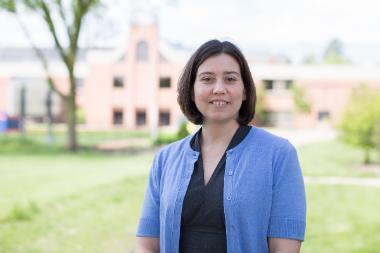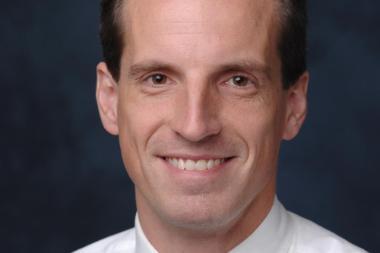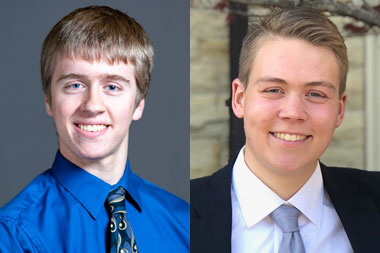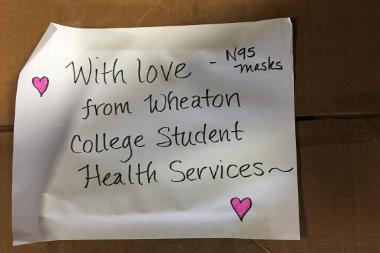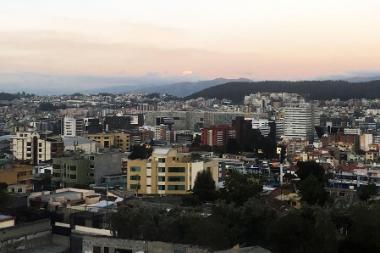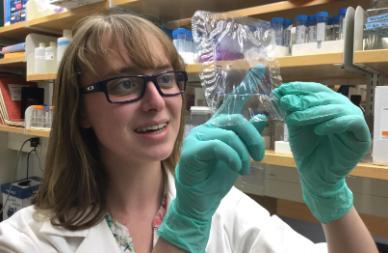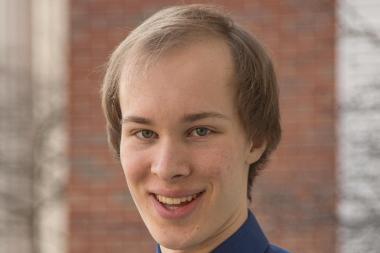Chemistry Department News and Stories
NSF Grant for Burden Research
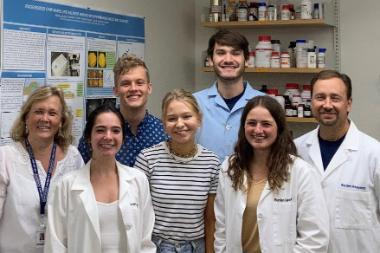
Wheaton faculty members Drs. Dan and Lisa Burden first encountered a toxin protein produced by Staphylococcus aureus during their postdoctoral years in Washington, D.C. This summer, the National Science Foundation awarded a major $352,070 grant to carry their research further.
Dan, an analytical chemist, started researching the toxin protein at the National Institute of Standards and Technology. His wife Lisa, a biochemist working at the National Institutes of Health, quickly became enthralled as well. Although the protein’s ability to harm human tissues and cells, as seen in MRSA infections, is well documented, the detailed molecular function of the protein remains obscure. That gap in knowledge is what first piqued the Burden’s interest and has driven their investigative endeavors ever since—particularly since there might be ways to alter the protein for more productive purposes.
The Burdens brought this research to Wheaton, where they both teach in the Chemistry department, introducing students to this protein and teaching them how to complete the lab work and scientific journal writing associated with it.
“We have a fascination with this protein,” Lisa admitted.
Several years ago, they made an exciting discovery in the Wheaton lab. The toxin protein, which looks like a mushroom cap, forms a passageway that can be opened and shut, like a molecular valve.
This is exciting for a number of reasons, including its possible application in the field of medicine. Since they’ve figured out how to controllably open and close the protein valve, in theory it could be used to assist with delivering a drug to a particular place in the human body.
"Imagine that you have a microscopic delivery vessel containing a drug with even smaller molecular valves built into its walls,” Lisa explained. “If you wanted the contents of the vessel to be given only to a diseased organ, you could send vessels there, trigger the valves to open, and unload the contents right near the treatment site, instead of distributing the drug and its potential side-effects throughout the body.”
With this NSF three-year grant, the Burdens, along with their Wheaton student researchers, are studying in closer detail which molecules travel through the opening of this toxin protein and whether or not certain molecules remain trapped inside a simulated delivery vessel when the protein passageway is closed.
This summer, Sophia Peña, Karsten Mohn, Cole Bothun, Sophie Anderson, and Sophia MacLean all Undergraduate Research Fellows as part of Wheaton’s 10-week Summer Research Program, have been executing experiments and helping with the instrument construction phase, which will enable further study of the protein in upcoming years.
“Our ultimate goal is to understand really well how the protein works and also find new utility in it—things that it can do that haven’t yet been realized or taken advantage of,” Dan said. “As we modify the protein and study it, we are discovering new applications for this molecular valve.”
--Emily Bratcher
Josh Dunbar ’21 - Goldwater Scholar
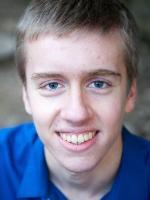 Chemistry major Joshua Dunbar ’21 has just been named a 2020 Goldwater Scholar.
Chemistry major Joshua Dunbar ’21 has just been named a 2020 Goldwater Scholar.
The Goldwater Scholarship is the most prestigious national award for undergraduates in the natural sciences. Joshua has done research at Savannah River National Laboratory and at also at Wheaton. He would like to obtain a Ph.D. in radiochemistry and eventually work to make the nuclear fuel cycle safe, sustainable, and cost-effective.
Joshua’s parents are also Wheaton chemistry major alums: Tim Dunbar (’92) and Jennifer Horney Dunbar (’92). (All three Dunbars have the unique distinction of having won our department’s Bernard Nelson Prize for Organic Chemistry.)
We are extremely proud of this high honor for Joshua!
More Information on Joshua
Chemistry major. Did research at Savanah River National Laboratory this past summer and is currently working with Dr. Ben Lovaasen in Chemistry.
Career Goal
I desire to obtain a Ph.D. in radiochemistry and eventually become a researcher at a national laboratory working to make the nuclear fuel cycle safe, sustainable, and cost-effective.
Further Description of Career Goals
Few events have changed the face of the world so much as the advent of nuclear energy. Harnessed peacefully, nuclear energy can provide clean power to the world for hundreds of years. The key challenge blocking further acceptance and usage of nuclear energy is ensuring that waste is kept to a minimum and environmental contamination is eliminated entirely. I desire to apply my passion for nuclear chemistry by leading a team of researchers at a national laboratory in improving the chemistry of the nuclear fuel cycle to enhance safety, sustainability, and cost-effectiveness. I believe strongly in the power of nuclear energy to provide the world with long-term power, but at present, fuel cycle limitations hamper its potential. The current fuel cycle only uses fuel once, because present reprocessing methods generate large amounts of byproduct solvent waste and are nonproliferation threats. I believe that better reprocessing technology would enable a dramatic increase in the uptake of nuclear power in the US and worldwide.
In high school I explored my interest in nuclear science by taking a college-level course called Nuclear Energy: Past and Present (a class focused on the history of the atomic bomb). Over the course of the semester, I felt a deep appreciation for both the tremendous power and the immense moral issues that arise from unleashing the atom. Desiring a more solid foundation in the hard science of nuclear chemistry, I participated in the ACS Nuclear Chemistry Summer School. This time provided me with a valuable introduction to radiochemistry and basic nuclear physics and to laboratory techniques that will be key in pursuit of my professional goals.
In order to gain more laboratory experience and introduce myself to the national laboratory system, I interned at the Savannah River National Lab this past summer. The research I participated in while there provided me with in-depth knowledge of radiochemical analytical techniques and built up my critical thinking skills for future research endeavors. I am now participating in inorganic chemistry research at my university, where my professor and I are working on new metal-ligand bonds. I anticipate that knowledge I gain through the course of this research will be helpful to understanding radionuclide-ligand interactions in nuclear fuel cycle separations.
This summer, I will either continue with this project or intern at the Pacific Northwest National Lab in the discipline of radiochemical separations. This will provide me with knowledge and laboratory skills directly applicable to a gaining a PhD in radiochemical separations and eventually applying that PhD in a national lab setting working on fuel cycle chemistry. The world-class research skill set and knowledge base acquired in pursuing my PhD will enable me to tackle my passion for improving reprocessing technology. I hope my career will contribute toward enabling nuclear energy to cleanly power the world for hundreds more years.
